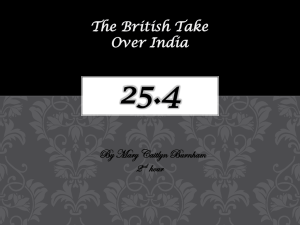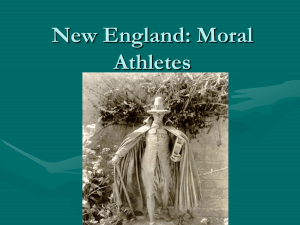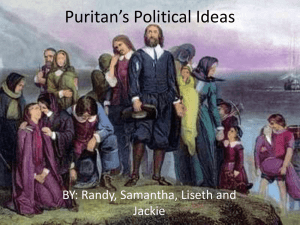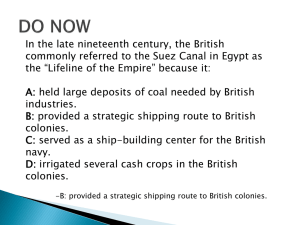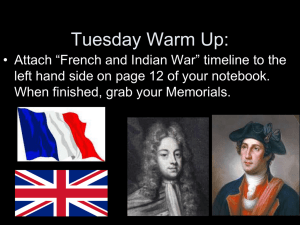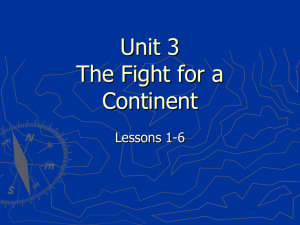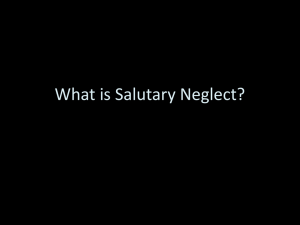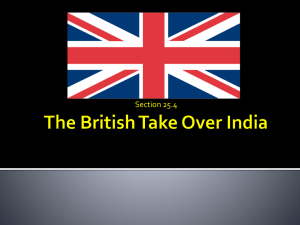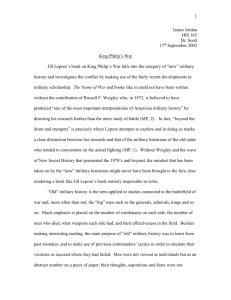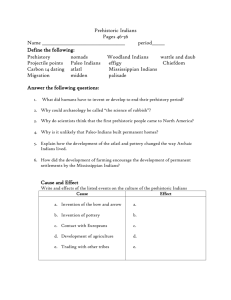Mary Rowlandson/Jill Lepore
advertisement
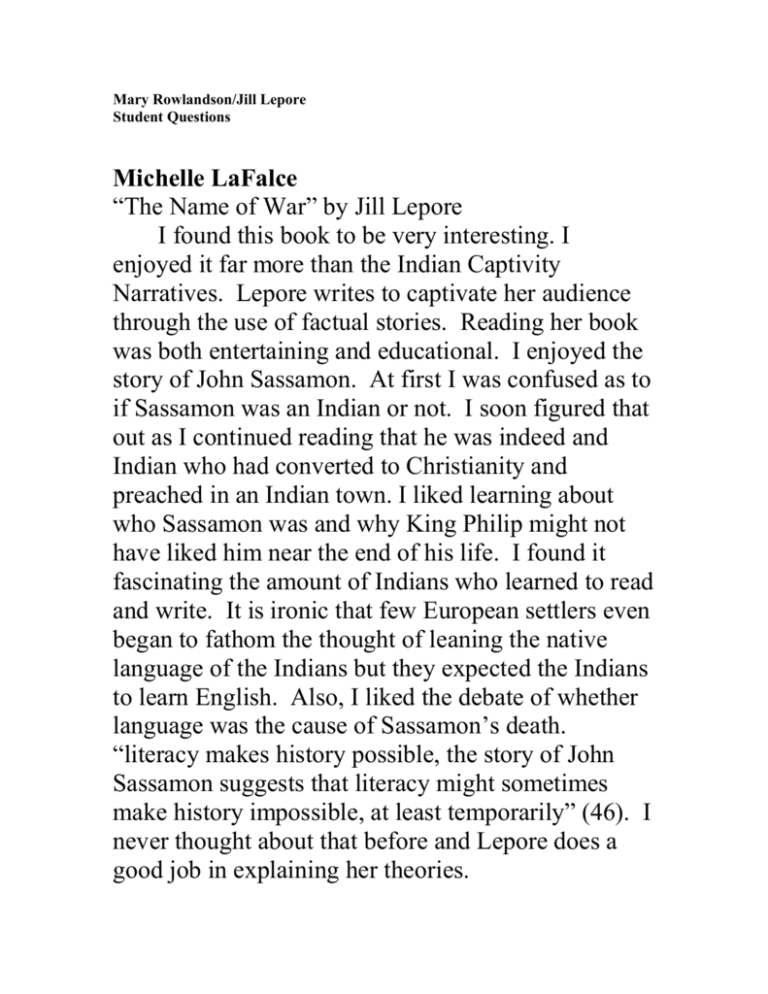
Mary Rowlandson/Jill Lepore Student Questions Michelle LaFalce “The Name of War” by Jill Lepore I found this book to be very interesting. I enjoyed it far more than the Indian Captivity Narratives. Lepore writes to captivate her audience through the use of factual stories. Reading her book was both entertaining and educational. I enjoyed the story of John Sassamon. At first I was confused as to if Sassamon was an Indian or not. I soon figured that out as I continued reading that he was indeed and Indian who had converted to Christianity and preached in an Indian town. I liked learning about who Sassamon was and why King Philip might not have liked him near the end of his life. I found it fascinating the amount of Indians who learned to read and write. It is ironic that few European settlers even began to fathom the thought of leaning the native language of the Indians but they expected the Indians to learn English. Also, I liked the debate of whether language was the cause of Sassamon’s death. “literacy makes history possible, the story of John Sassamon suggests that literacy might sometimes make history impossible, at least temporarily” (46). I never thought about that before and Lepore does a good job in explaining her theories. http://www.answers.com/topic/john-sassamon This is a website about John Sassamon’s life. I also found a book called “Igniting King Philip’s War: The John Sassamon Murder Trial.” It looked like it would be very interesting to read. Here is the website to the book. http://www.kansaspress.ku.edu/kawign.html Maria Fortson Reading Response According to Lepore in The Name of War, language is an important and often forgotten aspect when writing about history. Before television and pictures, people had to give their personal accounts when recording history. Because it is retold in the author’s perspective who is usually not an actual historian, the recollection tends to be biased and onesided. It is important to remember that during King Philip’s War, the majority of the Native American people were illiterate in the English language. The history that is recorded during this time was written by the Europeans who were fighting the Native American people. It is difficult to comprehend the reasoning behind the hatred towards the Native Americans. After reading Lepore, I felt misinformed about the entire history of King Philip’s War. If the documented information is recorded by the European Americans and not the Native Americans, how can we really know what went on during that time? How can we be certain about anything? http://www.nativelanguages.org/wampanoag.htm Mechelle Puckett I particularly liked the passage on page XIV in the second paragraph down: "this triangulated conception of identity would form the basis of American nationalism as it emerged in the late eighteenth and nineteenth centuries." Here, Lepore claims that English identity in New England, and then later American identity, was a byproduct of reactions to both the natives and the continental Europeans. I think this is a strong claim that I look forward to studying further. This is new ground for me to cover. "B. How, according to Lepore, did New Englanders use language to make sense of violence during King Philip’s War?" According to Lepore, the New Englanders would have to win the war twice- as she says, the first would be one of wounds, the second would be one of words. The Puritans needed to firmly establish their "Englishness." If the war had to be fought, they would have to win, and use their "literall advantage" to justify their participation in violent acts against the heathens who did them wrong. History often paints a fairer picture to those who write it. The Indians had no chance of winning the war of words, and no fair possibility of representation. Todd Cates Some of the questions I would like to discuss are: How do we use language to justify our violence? How has today's media changed the old axiom that "the winners write history?" Can we still even say that today? Samantha Davis Rowlandson and Lepore I thought the most interesting point made by Lepore was the fact that Puritans during the war viewed the war as punishment for not converting the Indians around them. Their sins were causing loses in the war to their “heathen” Indian neighbors. A quote by Increase Mather supports this claim by Lepore; “War” is “the greatest of all outward Judgments.” All acts of war were seen as God’s anger against the Puritans for their sins. Mary Rowlandson discusses this during her captivity, as well as the fact that her captivity shows her a need to become closer to God. Questions: Why did the Puritans see the acts of war committed by Native Americans as “barbarous”, yet turned a blind eye to their own killing of the “enemy”? Did Puritans allow “Christianized” Indians to join Puritan society? Gerrit Breves There were a few remarkable parts in „The Name of War“, which I briefly comment on. At first I want to start with a comic part which committed to my memory: Reverend Cotton Mathers attempt to avoid the publishing of one of Hubbard’s books. They were both Puritan Ministers and Mathers thoughts should have been more pure. Instead he acted like an envious man and not like a man of god, as he should have acted. For me, this is very remarkable because I thaught that Puritans were tightened in their faith and spirit. Other parts increased my understanding of Mary Rowlandson’s book, especially the way the Puritans behaved and it delivered a broader insight to their culture. For instance how the appeal of persons showed how civilized they were. For example long hair was vaguely associated with cannibalism. Indian women and even men fitted very well in this Puritan’s point of view. But it was not only the Indian’s hairstyle which mattered, their clothing, faces and specifically their skin colour appeared strange, uncivilized and demonical to the Puritans. Also the Indian’s way of cultivating the land and their nomadism made the Puritans believe they were (or should be) the legitimate (Gods chosen) owners of the Indian’s land. For the Puritans civilization expressed itself in their way of agriculture and the establishment of towns & villages (permanent residence). David Epps ---For New Englanders, I think that the meaning of the war was mainly about survival. The Puritans had come from England to escape oppression and hard times only to come to the new world to face even bigger ones. Both sides saw the other as a threat to their ways of life and unfortunately both sides decided that war between them would perhaps bring about a resolution to their differences ---The New Englanders used language to make since of the violence in order. Sometimes the atrocities they witnessed were too much to keep inside and so they felt as though they needed to write down what they saw in order to cope as well as not forget what had happened. In addition, language helped the Puritans because when they chronicled events that happened they tended to use softer language to describe themselves and harsh language about the Indians. This made them as well as readers feel as though they were the "Good guys". Emmanuel Reddish Dr. Erben- Here is my response posting. Emmanuel Reddish I believe that King Philip's War was a war concerning a contest between chaos and order. The Puritans believed that the indians were of nothing but chaos and disorderly conduct. they also feared that they were a threat to their land and property that they believed properly belonged to them. This was a fight for survival for the indians and the puritans wanted to get rid of these heathens. It is a combination of all. My Quote: (pg. 77)- "But during the war it seemed to many colonists that all that had made them English and all that had made the land their own--their clothes, houses, barns, churches, cattle, and crops-were being threatened." Check out this website. it is great at briefly analyzing King Phillip's War: The causes, the war itself, and the effects. http://www.pilgrimhall.org/philipwar.htm Marquita Elder According to In the Name of War, minister Samuel Nowell cites “three causes of War…1.For defence of ourselves. 2.To recover what hath been taken away. 3.To punish for injuries done” (120). The meaning for King Philip’s War in New England, however, hinged on radically different concepts. Although many colonists cited some of the same reasons addressed in the question, ultimately, embedded within each of those justifications lay the colonists’ determination to prove their superiority, both religiously and, in some ways, economically. For young America, such goals were especially important. Above all, colonists simply wanted to establish successful homesteads, homesteads mandated by the very God they served, and thereby establish an identity for themselves, locally and globally. Refusing to fight, for colonists, was akin to succumbing to the wilderness, to the metaphorical darkness they had only so recently escaped from. In the wake of the war’s earliest devastations, Lepore explains colonial identity as such: “By becoming as nomadic as Indians, they had not lost only their property but their identity as well, “blown / From place to place without a home to own” (83). The war was a fight for the land. Even the Puritans were not beyond enjoying wealth’s fruits. Dobrinka Genevska-Stamm Pirates and Emperors How people name a war in terms of exact description and how it is viewed in terms of intensity and duration may vary from one war to another, but the facts that it is always “the greatest cruelty of human race” and that there are always two sides of one and the same story remain constant. One can describe battles in pictures or in words like “brutal,” “bloody,” “massacre” etc. Every war is unique in terms of exact circumstances and length. Still every war is the same, because of the very fact that there are always losses on the side of humanity. Furthermore there are always two competing forces, calling themselves enemies. The English settlers have called the Indians “enemies” and the Indians have attached the same attribute “enemy” to the Puritans. The actual problem occurs when we take a closer look on the discrepancy between how each side calls themselves and how it calls “the others.” The English have claimed their actions to be “justice” whether naming those of the native Americans “cruelty.” It is more convenient and it justifies the own actions especially in the name of the own nation, culture or peoples. It has been the European “self” against the Indian “other,” which later on shifts a little bit to an English “self” and a Spanish “other” etc. If the reasons are to be justified or not is just another question, but primarily this is what each side always says. The simile of the pirate and the emperor by Noam Chomsky is just another example for the same phenomenon. Both the pirate and the emperor rule exactly the same way. The only difference is how they view themselves. The emperor is the “good” one whereas the pirate is “evil.” Such definitions attach qualities to the “other,” which are not necessarily true. Most of the time they are, have always been and will always be merely convenient. Dear Dr. Erben, James Boles I found it very interesting, early on, that the author used the word typically several times over to describe heinous acts of violence. Being away from England created a cultural identity crisis for the colonists. Cultural and personal doubts were created by not only the isolation from Great Britain, but also from extreme exposure to the Native American culture. I believe that this highly traumatic isolation from "Englishness" created a window of opportunity to indulge in oppression and violence as it became an excuse or an out on why they were being barbaric. The war for the Puritans was fought for many reasons. One reason that probably fueled the English war machine was that they were fighting to reclaim the identity they were afraid of losing. However, the reality was the English were trying to culturally change the Indians, not the other way around. The inability of the colonists to recognize that they were inflicting their worst gears on their neighbors is interesting. The English were doing their best to avoid cruelty to maintain their civility, but why? England's cruel treatment of Ireland and its inhabitants is well documented. It appears as if violence and cruelty were more accurate adjectives to describe English tradition. This incredible negligence is only made possible by the literary war that the Puritans used on themselves to justify their very un-"Englishness" action. Interesting Passage: "... wage the war, and win it, by whatever means necessary, and then write about it, to win it again. The first will be a victory of wounds, the second a victory of words." (Lepore 11) Joseph Benise “In the Name of War” written by Jill Lepore gives the view point from the Indians side of the war and how they looked toward the settlers. Two pages that stick out in my mind that have to deal with Mary Rowlandson was quoted in “In the Name of War” on page seven “Not only had the English taken Indian lands and disrupted traditional systems of trade and agriculture, but they also had corrupted the power of native rulers, or sachems, and attempted to eradicate the influence of powwows, native religious leaders. Philips himself believed that too many Indians had been Anglicized and Christianized, praying to an English God and even learning to read and write.” The English looked upon the Indians as satanic barbaric people that did not have a well writing system. Both the Puritans and Indians looked upon each other as a threat and the Indians. I also noticed in the book that the Puritans in a sense didn’t want to loose there Englishness but also keep there Englishness. Joshua Waychoff In the Mary Rowlandson piece, she kept using passages from the Bible to explain what was happening to her at certain moments. Did the use of these passages also serve as a way to influence those who read this narrative towards the Puritan way, or were they used to justify the things the Puritan went through in her captivity? There seemed to be several instances throughout the reading where the Indians seemed to taunt her about killing her, her husband and going home. I believe this was used to show the reader just how apathetic the Indians seemed to her. Rebecca Gilliland The war is all four according to Lepore. This is made obvious by her use of titles to vacillate between two sides of the argument and her descriptions and citations within each chapter and sub heading. I think it’s more a clash of the two cultures in all respects that initialized the altercation(s) that’s dubbed a war. Her thesis is straight forward and well laid out with ample references to Increase Mather and Mary Rowlandson so it fills in the gaps in our discussion so far. My choice of discussion page is 119. This page seems to get to the meat of the argument over the differences and explanations for both sides of the debate and hits on a few of the issues covered in the prior chapters. Kenny Rivers In the first chapter of Jill Lepore’s, In The Name Of War, she shows how the New Englanders used language to make sense of the violence during King Phillip’s War. She tells how the New Englanders told about the delight the Indians took in their savagery, and how the New Englanders were appalled and pained to have to watch the torture of the Indians. She also makes a point to tell how the Indian being tortured shoed no signs of agony yet the New Englanders felt his pain. In doing this they were able to further themselves from the savagery and show the pain that it caused them. This enforced that they were still Englishmen and had not given into the ways of the Indians. Kyle Johnson As I read the account of Mary Rolandson, I noticed her opinon of her captors, as the text progressed, became less of a heathonistic view and sort of morphed into that of an equal (on a human level). As we discussed in class, Mather's intent on getting Rolandson's story out to the public was to show the horrors and the inhumanity that were the natives. What it seems to me is that the Rolandson text, dosen't agree with the capture, but what it does do is humanize a distinctly "inhuman" (by Puritian standards) individuals. Along with this, the Rolandson text is a tale of the power and determination of a woman. This could deffinatly be seen as an empowerment text, and, at least I think so, that Mather would not have been too fond of this. -Ashleigh Higgins -What is the meaning of King PhilipÂ’s War for the New England Puritans? It is never easy for to very different worlds to come together in harmony. This has long been the history of the United States. Since the birth of the nation, people of varying national origin have fought tirelessly to stake claim on their piece of land and to be able to live as they choose (while continuing their own cultural practices). (Ex: American Indian v. Colonists; Irish v. Americans of English Descent; Chinese immigrants v. Frontier settlers; Black Americans v. White Americans). A clash between races is somewhat of answer, but far too simple. It is not the actual existence of various races, but the fear of the unknownÂ…the fear of changeÂ…the fear of norm violationÂ…the fear of competition that drives racial/ethnic conflict. The same can be said about the conflicts which existed between New England Puritans and the American Indians (King PhilipÂ’s tribes). *see pic of King Philip @ http://www.colonialwarsct.org/images/1675_philip.jpg Eve Fletcher King Philip’s War clearly had a number of different meanings for New England Puritans. Yet, in the prologue Lepore makes an interesting observation by noting that cultural isolation was an important factor for the colonists. While Indians fought to maintain their lifestyle, Lepore states that the New England colonists fought to “free themselves of doubts of their own Englishness” (8). Although the colonists apparently experienced anxiety, it never occurred to me that they would have had so many questions and concerns about their own identity. In trying so hard to establish their role, the colonists would have been unwilling to positively identify with the lifestyle of the Indians. The colonists also had fears about their own savagery, and as Lepore notes in the prologue, their disgust served as a way to differentiate their identity from that of the Indians. It is almost as though maintaining a peace with the Indians was nearly impossible, since the colonists feared that their lifestyle and morality would deteriorate just by association. The colonist’s preoccupation with their identity made it necessary to represent King Philip’s War as a battle between civilization and savagery.

